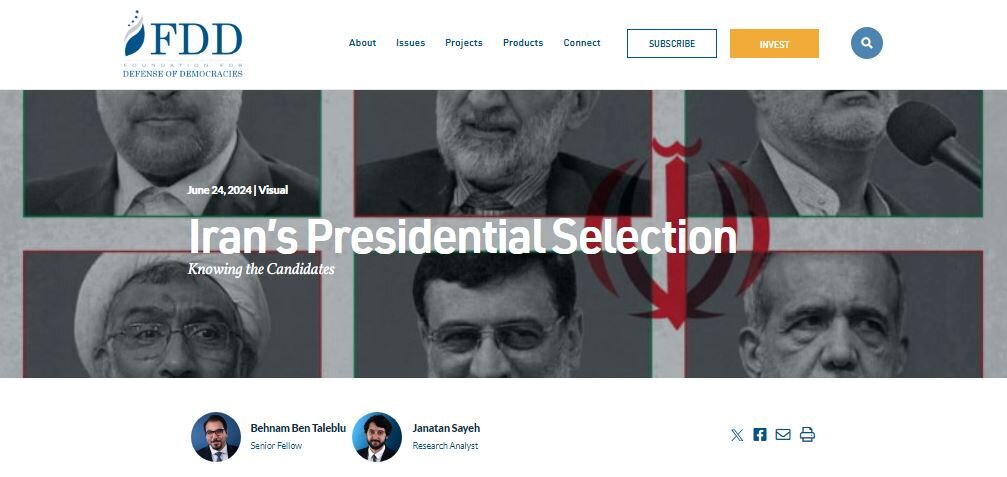Debunking FDD waffle on Iran’s elections

TEHRAN- In a note published on the FDD website on June 22, 2024, Behnam Ben Taleblu and Janatan Sayeh wrote that " Iran’s Presidential Election Seeks to Consolidate Regime’s Control". This note presents a good opportunity to have an overview of holding elections in Iran while answering the claims of the authors.
Since the Islamic Revolution's triumph in 1979, Iran has conducted over 40 elections, enabling the populace to elect their representatives and presidents across diverse political spectrums. Even with challenges like the war right after the revolution and natural disasters, the electoral process has persevered uninterrupted, solidifying its place as an integral component of the people's political engagement.
When the president of Iran and his entourage tragically passed away on May 19, 2024, as the nation mourned and prepared for a new presidential election, Western media outlets began circulating reports following a familiar pattern. In this analysis, I address one of these notes and counter some of its assertions.
At the beginning of the note, the authors claimed that "Iran's Guardian Council, a 12-person body appointed by Supreme Leader Ali Khamenei that approves candidates for office, has permitted six out of 80 potential candidates to run in the special presidential election on June 28." According to the Constitution of the Islamic Republic of Iran, which was approved by the people's vote, the qualifications of the presidential candidates are approved by the Guardian Council before the elections. As per Article 91 of the Constitution, the Guardian Council consists of 12 members who are elected for a six-year term. Six of its members, who are Faqih (Islamic jurist), are appointed by the Leader - who is also elected by the people's representatives - and the other six members, who are legal experts with expertise in various legal fields, are introduced to the Islamic parliament of Iran by the head of the judiciary and are elected by the representatives of the people in parliament. Therefore, this council, on behalf of the people, after reviewing the personal, managerial, security, judicial, citizenship, and other records of the candidates, introduces those candidates who meet the required criteria for participation in the elections.
The authors claimed in another part of their note that "75 percent of Iranian viewers did not even watch the presidential debates." The authors assert that 75 percent of Iranian viewers did not watch the presidential debates, which had not all of them yet been held at the time of the publication of this note on June 22, 2024, and the authors, by distorting the ISPA report, have generalized the statistics related to the viewership of the first debate to all debates.
The main point in this report, similar to other reports in Western media, emphasizes the boycott of elections by the people of Iran and disregards a significant portion of the Iranian population who made efforts to elect their favorite candidates and went to the polls. To better understand the positions of the publisher of this note, a review of the activities of FDD is necessary. The FDD, known as part of the Israel lobby in America, was established in 2001 as Emet, which means truth in Hebrew, and its mission was to promote the image of the Zionist regime and related issues. After the September 11, we witness a new face of the FDD, and this institution continues its activities under the name Foundation for Defense of Democracies. While the FDD claims to receive no funding from any government, it continues to operate by receiving large sums of money from prominent Zionists and supporters of Israel. In fact, while the writers of FDD as the media arm of the Zionists are measuring the health of Iran's elections with a microscope, a little further away, their supporters have committed the biggest genocide of the century and deprived a huge population of their basic rights, i.e. the right to life. In other words, institutions of this kind, which always stand on the side of war supporters, do not consider a part of the world's population to have the right to breathe, let alone to vote. Therefore, what is desired by this group of writers or politicians is blind pursuit of their desired policies by people, otherwise even their lives are not worth discussing.
